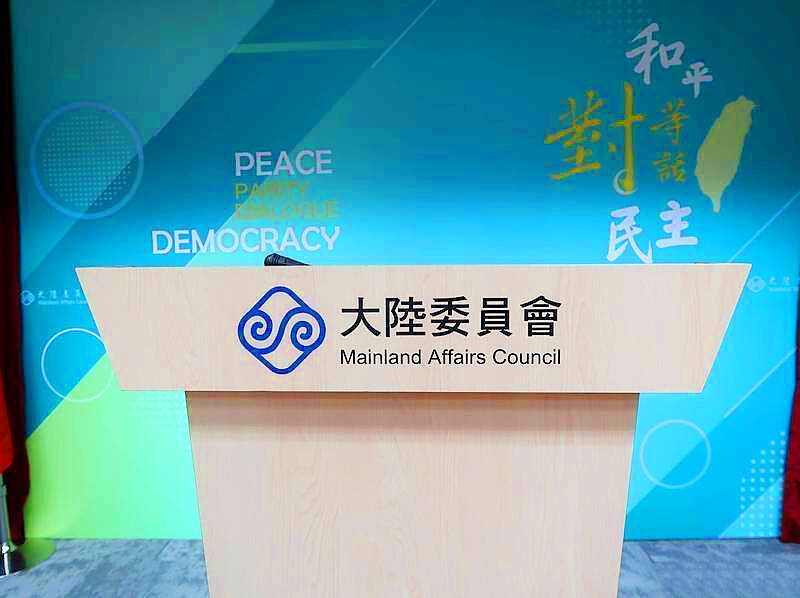China’s “Anti-Secession” Law has no binding force over Taiwanese, Mainland Affairs Council (MAC) Minister Chiu Chui-cheng (邱垂正) reiterated yesterday, as Beijing marked the legislation’s 20th anniversary.
Chinese Minister of Foreign Affairs Wang Yi (王毅) attended the event at the Great Hall of the People in Beijing, but Chinese President Xi Jinping (習近平) was conspicuously absent, despite expectations that he would take part in the symbolic event.
Speaking at the event, National People’s Congress Standing Committee Chairman Zhao Leji (趙樂際) said that under Xi’s leadership, the Chinese Communist Party’s Central Committee has comprehensively implemented his “thought” on resolving the “Taiwan question.”

Photo: Chung Li-hua, Taipei Times
China must maintain its dominance and initiative over cross-strait relations, as it conducts efforts to “unify” the nation against Taiwanese pro-independence forces, he said.
The “Anti-Secession” Law’s main objectives include deterring and countering Taiwanese separatists to promote unification under the guidance of “Xi Thought” and the rule of law, he said.
China’s Taiwan Affairs Office Director Song Tao (宋濤) said that the “Taiwan question” is an internal matter that would brook no interference from foreign forces.
The “Anti-Secession” Law aims to maintain national sovereignty and territorial integrity by utilizing countermeasures and deterrence, he said, adding that the legislation draws a “clear red line” setting conditions for “the use of non-peaceful means to counter the actions of pro-Taiwanese independence forces.”
In Taipei, Chiu said the “Anti-Secession” Law is part of Beijing’s efforts to wage lawfare against Taiwan.
The Chinese law has no power over Taiwanese or the Republic of China’s sovereignty, he said.
Beijing’s actions only serve to alienate Taiwanese, increase mutual hostilities and obstruct diplomacy across the Strait, he said.
The Mainland Affairs Council will steadfastly defend the nation’s sovereignty, democracy, prosperity, peace and stability, standing in solidarity with all Taiwanese against Beijing’s ambitions to annex Taiwan, he said.
Taiwanese are resolute in resisting annexation, which will only make the nation stronger, he added.
Former Chinese Nationalist Party (KMT) mainland affairs director Huang Ching-hsien (黃清賢) claimed to represent his “Taiwanese compatriots” in speaking at the event.
Taiwanese compatriots could obtain perks for achieving their dreams and bringing glory to China’s magnificent tradition only by acknowledging that they are part of the Chinese family, said Huang, who teaches at Nankai University’s Zhou Enlai School of Government.
The “Anti-Secession” Law is a legal and peaceful method to accomplish the “unification of the motherland” to the mutual interests of peoples from both sides of the Strait, he added.
In response, the MAC said Huang might represent some KMT members, but he does not represent Taiwan.
The KMT declined to comment yesterday.
China’s National People’s Congress on March 14, 2005, passed the “Anti-Secession” Law, giving legal license to check so-called “secessionist” forces in Taiwan through “non-peaceful means or other necessary measures.”

A Ministry of Foreign Affairs official yesterday said that a delegation that visited China for an APEC meeting did not receive any kind of treatment that downgraded Taiwan’s sovereignty. Department of International Organizations Director-General Jonathan Sun (孫儉元) said that he and a group of ministry officials visited Shenzhen, China, to attend the APEC Informal Senior Officials’ Meeting last month. The trip went “smoothly and safely” for all Taiwanese delegates, as the Chinese side arranged the trip in accordance with long-standing practices, Sun said at the ministry’s weekly briefing. The Taiwanese group did not encounter any political suppression, he said. Sun made the remarks when

The Taiwanese passport ranked 33rd in a global listing of passports by convenience this month, rising three places from last month’s ranking, but matching its position in January last year. The Henley Passport Index, an international ranking of passports by the number of designations its holder can travel to without a visa, showed that the Taiwan passport enables holders to travel to 139 countries and territories without a visa. Singapore’s passport was ranked the most powerful with visa-free access to 192 destinations out of 227, according to the index published on Tuesday by UK-based migration investment consultancy firm Henley and Partners. Japan’s and

BROAD AGREEMENT: The two are nearing a trade deal to reduce Taiwan’s tariff to 15% and a commitment for TSMC to build five more fabs, a ‘New York Times’ report said Taiwan and the US have reached a broad consensus on a trade deal, the Executive Yuan’s Office of Trade Negotiations said yesterday, after a report said that Washington is set to reduce Taiwan’s tariff rate to 15 percent. The New York Times on Monday reported that the two nations are nearing a trade deal to reduce Taiwan’s tariff rate to 15 percent and commit Taiwan Semiconductor Manufacturing Co (TSMC, 台積電) to building at least five more facilities in the US. “The agreement, which has been under negotiation for months, is being legally scrubbed and could be announced this month,” the paper said,

MIXED SOURCING: While Taiwan is expanding domestic production, it also sources munitions overseas, as some, like M855 rounds, are cheaper than locally made ones Taiwan and the US plan to jointly produce 155mm artillery shells, as the munition is in high demand due to the Ukraine-Russia war and should be useful in Taiwan’s self-defense, Armaments Bureau Director-General Lieutenant General Lin Wen-hsiang (林文祥) told lawmakers in Taipei yesterday. Lin was responding to questions about Taiwan’s partnership with allies in producing munitions at a meeting of the legislature’s Foreign Affairs and National Defense Committee. Given the intense demand for 155mm artillery shells in Ukraine’s defense against the Russian invasion, and in light of Taiwan’s own defensive needs, Taipei and Washington plan to jointly produce 155mm shells, said Lin,